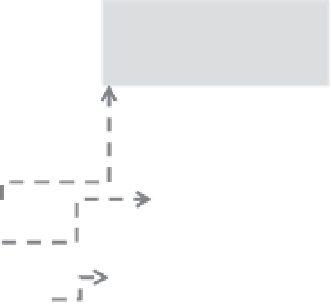Agriculture Reference
In-Depth Information
Land management
projects for enhanced C
storage
Satellite imagery interpreted for land
cover change, with known accuracy and
legend matching C data sets and activity
data
National account-
ability for appro-
priate mitigation
actions
See Fig. 31.2 for
further linkages
Area-based
accounting
(national,
subnational
or 'project'
level)
Management infor-
mation on land-use
systems: life-cycle,
drainage, fertilization
Good management
practice certification
for international trade
Fig. 31.5.
Area-based and trade-based interventions to reduce net emissions from land use (change)
interact with the national accounting frame (compare
Fig. 31.2)
and accountability vis-à-vis nationally
appropriate mitigation actions.
argument to include all soils, to avoid the
type of definitional confusion that has con-
siderably slowed down REDD efforts.
The IPCC AFOLU accounting frame-
works require that changes in soil carbon
stocks across all land uses are part of a
5-
yearly (non-Annex-I) or annual (Annex-I)
reporting cycle at the national scale. Is there
scope for monitoring at subnational or 'pro-
ject' scales as well?
Table 31.2
summarizes
the pros and cons of the argument.
concern that cannot be addressed easily
without new research.
The integrity of the accounting sys-
tem is challenged by cross-border trade,
especially where this involves Annex-I and
non-Annex-I countries. Long-term stock
change is the primary accounting base
for terrestrial carbon and has a diminish-
ing cumulative error, as overestimates of
change for a single period tend to be com-
pensated by underestimates for a subse-
quent period. Flow accounting errors do
not diminish by accumulation, and cumu-
lative trade estimates need to be reconciled
with the stock changes they lead to. There
is, however, little reason to treat carbon in
internationally traded wood differently
from carbon in other organic produce, be it
used as animal feed, human food and fibre,
or as a source of bioenergy (van Noordwijk
et al
., 1997). The inclusion of international
trade in wood and wood products in car-
bon accounting has long been debated
(Winjum
et al
., 1998). If implemented, it al-
lows wood-exporting countries to claim
carbon sequestration - but the consequent
emissions in importing countries are pref-
erably ignored. Lauk
et al
. (2012) con-
cluded that increments from 1900 to 2008
in the carbon stocks held in wood and
Integrity of accounting rules
Spatial aggregation shifts determinants of
uncertainty in soil C stocks in ways that
are poorly recognized as yet (Lusiana
et al
.,
2013). The confidence intervals around
national estimates of net soil C change are
much narrower than those at project level,
due to the number of the at least partially
independent replicates involved. The ag-
gregate numbers mostly suffer from pos-
sible bias, rather than random error. Biases
inherent in the availability of data that are
not derived from stratified random de-
signs, but depend on whatever has been
collected for other reasons, are a major













































Search WWH ::

Custom Search